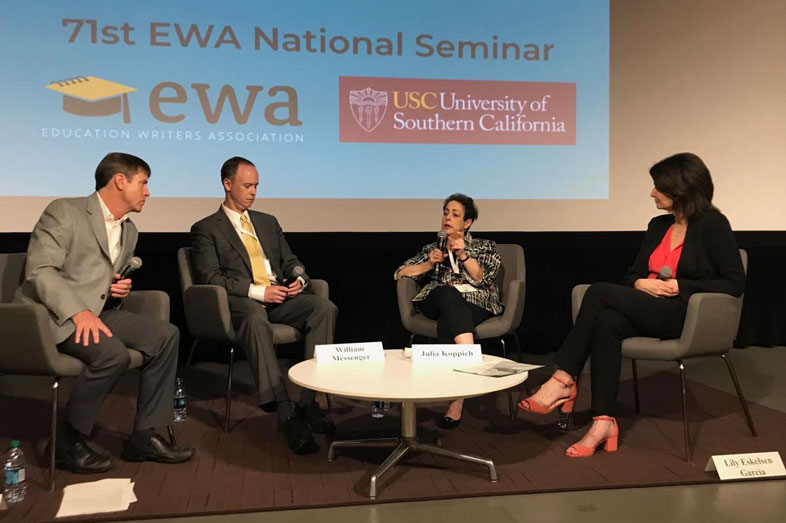The U.S. Supreme Court is on the cusp of a decision that could reshape teachers’ unions, putting new pressure on them to convince educators that paid membership is worthwhile.
At issue is a case over whether public employees, including teachers, who choose not to join unions can be required to pay agency fees. (Those fees typically cover the costs of collective bargaining.)
The case pits Mark Janus, an Illinois child-support specialist, against the union that charged him fees, the American Federation of State, County and Municipal Employees, Council 31. The decision, however, would have broad implications for unions that represent teachers.
“If the court rules for Janus and against the unions, unions won’t disappear,” said education consultant Julia Koppich, of J. Koppich & Associates during a panel discussion last month at the Education Writers Association’s annual conference. But, she added, “the decision is likely to require unions to reimagine their organizing roots, as they try to figure out how to give teachers a reason to join the organization and to remain with the organization.”
Janus’ argument is essentially that required fees are a violation of his right to free speech because he is forced to support a union that advocates for positions he opposes. He is represented by the National Right to Work Legal Defense Foundation and the Liberty Justice Center. On the other side, AFSCME argues that the fees prevent free-riders from getting the benefits of a union-bargained contract without paying for membership.
(For more analysis of the forthcoming decision and its potential implications, check out this EWA blog post: Five Question to Ask After Court’s Forthcoming Janus Ruling.)
Janus is the latest in a series of cases in which the Supreme Court has taken up similar issues.
In the 1977 case, Abood v. Detroit Board of Education, the court ruled that employees who are not union members can be charged fees for negotiating their contract. The issue came before the court again in 2016, when a group of California teachers sued over agency fees. But the high court, which had only eight members at the time, deadlocked. As a result, the decision on Janus’ case could come down to the court’s newest justice, Neil Gorsuch, who was nominated by Republican President Donald Trump and narrowly approved by the U.S. Senate in 2017
The consensus of speakers on the EWA panel was that the most likely outcome of the forthcoming Supreme Court decision is a ruling in favor of Janus that would bar unions from charging agency fees.
‘A New Chapter’?
The losses could be steep for teachers’ unions. On the local level, powerful unions such as the New York City chapter of the American Federation of Teachers are also bracing for the decision. But in dozens of other states where unions are less powerful, the decision may not have a significant impact because agency fees are already not allowed.
The National Education Association, the nation’s largest teachers’ union, is projecting a loss about 300,000 members over two years as a result of such a decision, and plans to cut its budget by $50 million, according to a report from The 74 Million published after the EWA conference. During the EWA panel, NEA President Lily Eskelsen García did not offer specific numbers on the financial or membership losses she anticipates.
García said during the panel that unions can show their value for members regardless of the outcome of Janus. Teachers are increasingly aware of the power of collective voice following protests in West Virginia, Oklahoma, Kentucky, Arizona, North Carolina, and Colorado, she said.
In those states, teachers’ “unions have been suppressed and oppressed for decades,” García said. “They are awake. This is going to be a new chapter for us.”
García and Koppich both framed the Janus case in a broader context as part of a campaign to destroy public sector unions by reducing their membership and power.
Triggering Political Battles
But William Messenger, a lawyer for the National Right to Work Legal Defense Foundation, pushed back on that idea. Messenger, who argued the case on behalf of Janus before the Supreme Court, said that the issue in the case is narrow. The only question is whether it’s constitutional to require employees to pay union fees to keep their job, he said.
“If Janus is successful, the only direct result will be that no teacher or any other public employee could be forced against their will to support a union,” Messenger said at the EWA conference in Los Angeles. “The other implications you are talking about, with respect to effect on education or on the union, are really a few degrees removed.”
If the court rules in favor of Janus, as experts anticipate, it will be a pivotal moment for teachers unions both local and national — and it will likely trigger other political battles.
In states where unions are strong, lawmakers could enact other policies that make it more difficult for members to leave unions, such as short windows when they may quit. At the same time, growing enthusiasm for teacher organizing could help revive unions in states where they have been weakened.
